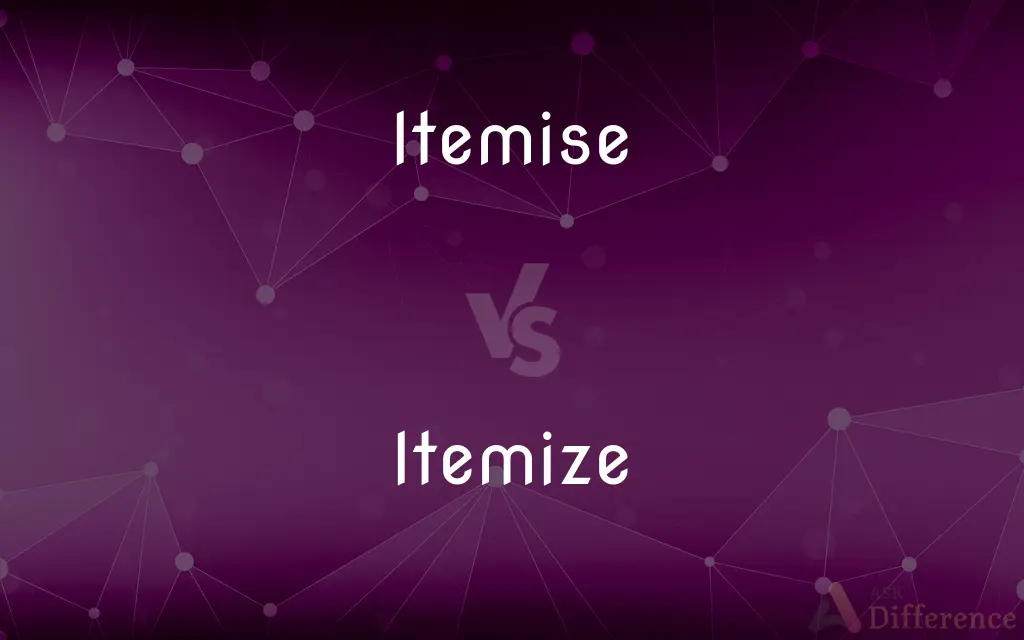Itemise vs. Itemize — What's the Difference?
By Tayyaba Rehman & Urooj Arif — Updated on April 1, 2024
Itemise and itemize are variants spelling the same concept of breaking down a list into individual items, with "itemize" being preferred in American English.

Difference Between Itemise and Itemize
Table of Contents
ADVERTISEMENT
Key Differences
Itemise is the British English spelling of the term, used to describe the action of creating a list where items are presented individually, typically with details or specifications for each. This could be applied in contexts such as budget planning, where expenses are itemised to show specific costs. On the other hand, itemize is the American English variant of the same word, adhering to the spelling conventions of the United States. It holds the same meaning and application, such as itemizing deductions on a tax return to specify each deductible expense.
The choice between itemise and itemize often depends on the regional or cultural context of the writing. For instance, a British company might release a report that itemises its charitable donations, using the spelling that matches British English conventions. Conversely, an American report would itemize the same kind of data, reflecting American spelling norms. Despite the spelling differences, the function and purpose of the verb in both forms of English remain consistent.
The use of itemise/itemize extends beyond financial documents to any situation where breaking down information into constituent parts is beneficial. For example, an event planner might itemise tasks to be completed before a wedding, while a project manager in the U.S. might itemize project milestones in a proposal. This versatility makes it a useful verb in various professional and personal contexts, regardless of the spelling.
In digital communication and software, the spelling might also be influenced by the default language settings. For example, a spellchecker set to British English would suggest "itemise," while one set to American English would recommend "itemize." This reflects the broader influence of regional language settings in technology on spelling and grammar preferences.
Though the spelling differs, the pronunciation of itemise and itemize is generally the same, contributing to their interchangeable use in spoken English. This shared pronunciation underscores the fact that the difference between them is purely orthographic, related only to regional spelling conventions, without affecting their meaning or use in conversation.
ADVERTISEMENT
Comparison Chart
Spelling Variant
British English
American English
Usage
Used in regions that follow British English conventions.
Used in regions that follow American English conventions.
Context
Official documents, reports, and communication in British English contexts.
Official documents, reports, and communication in American English contexts.
Pronunciation
Generally the same as "itemize".
Generally the same as "itemise".
Example Usage
"The budget was itemised to show every expense."
"The budget was itemized to show every expense."
Compare with Definitions
Itemise
To break down a list into individual components.
She itemised her daily tasks to manage her time better.
Itemize
To list items separately, often with additional information.
The tax form required him to itemize his deductions.
Itemise
To present or list items separately with details.
The invoice itemised all the products purchased.
Itemize
To organize information into a detailed list.
The app allows users to itemize expenses and incomes easily.
Itemise
To enumerate items one by one.
The presentation itemised the company’s goals for the next quarter.
Itemize
To enumerate distinctly.
The teacher itemized the criteria for the assignment.
Itemise
To create a detailed list.
The report itemises the findings from the research study.
Itemize
To make a list of items.
She itemized the ingredients needed for the recipe.
Itemise
To specify or detail items in a list.
The contract itemises the responsibilities of each party.
Itemize
To specify details in a list format.
The plan itemizes the steps necessary to complete the project.
Itemise
(British spelling) itemize
Itemize
To place or include on a list of items
Itemized her expenses on the proper form.
Itemise
Place on a list of items;
Itemize one's tax deductions
Itemize
To list the items of
Itemized the expense account.
Itemise
Specify individually;
She enumerated the many obstacles she had encountered
The doctor recited the list of possible side effects of the drug
Itemize
To list deductions from taxable income on a tax return
This benefit is available only to taxpayers who itemize.
Itemize
(transitive) To state in items, or by particulars
Itemize
To state in items, or by particulars; to list each item in a collection under discussion; as, to itemize the cost of a railroad.
Itemize
Specify individually;
She enumerated the many obstacles she had encountered
The doctor recited the list of possible side effects of the drug
Itemize
Place on a list of items;
Itemize one's tax deductions
Common Curiosities
Can itemise/itemize be used outside of financial contexts?
Yes, itemise/itemize can be applied in any context requiring the detailed listing of items or information.
Do other English variants besides American and British use itemise or itemize?
Other English variants may lean towards British or American spelling conventions, affecting their preference for "itemise" or "itemize."
Is there a difference in meaning between itemise and itemize?
No, the difference between itemise and itemize is purely spelling; their meanings are identical.
Are itemise and itemize pronounced differently?
Generally, they are pronounced the same, making them interchangeable in spoken English.
What does itemise/itemize mean?
Both terms mean to list or detail items separately, often including specific information about each item.
When should I use itemise vs. itemize?
Use "itemise" when writing in British English and "itemize" in American English contexts.
How do digital tools handle the differences between itemise and itemize?
Digital tools, like spellcheckers, adjust their suggestions based on the selected language variant (British or American English).
Does using itemise/itemize require additional details for each item listed?
Typically, itemising/itemizing involves providing details or specifications for each listed item, but the extent of detail can vary based on context.
How important is consistency in using either itemise or itemize in a document?
Consistency is key to maintaining professionalism and clarity in a document, especially within the same linguistic context.
How does spelling preference affect the use of itemise/itemize in software?
Software language settings may default to British or American English, influencing the spelling suggestion of "itemise" vs. "itemize."
Can changing the spelling from itemise to itemize impact the readability for international audiences?
While it may not impact readability, using the appropriate spelling for your audience can enhance the writing's regional appropriateness.
How do itemise and itemize relate to bullet points in a document?
Using itemise/itemize can involve listing items with bullet points for clarity and organization, though detailed descriptions may also follow each point.
What are common items that can be itemised/itemized in a list?
Expenses, tasks, ingredients, project milestones, and inventory are common items that can be detailed in a list.
Is itemising/itemizing a list necessary in all documents?
Not all documents require itemised/itemized lists; the need depends on the purpose of the document and the clarity needed for its intended audience.
What are the benefits of itemising/itemizing information?
Itemising/itemizing can enhance clarity, improve organization, and make information more accessible and understandable to the reader.
Share Your Discovery

Previous Comparison
Watercolor vs. Aquarelle
Next Comparison
Shield Bug vs. Stink BugAuthor Spotlight
Written by
Tayyaba RehmanTayyaba Rehman is a distinguished writer, currently serving as a primary contributor to askdifference.com. As a researcher in semantics and etymology, Tayyaba's passion for the complexity of languages and their distinctions has found a perfect home on the platform. Tayyaba delves into the intricacies of language, distinguishing between commonly confused words and phrases, thereby providing clarity for readers worldwide.
Co-written by
Urooj ArifUrooj is a skilled content writer at Ask Difference, known for her exceptional ability to simplify complex topics into engaging and informative content. With a passion for research and a flair for clear, concise writing, she consistently delivers articles that resonate with our diverse audience.














































